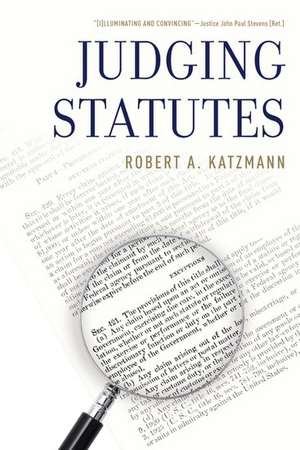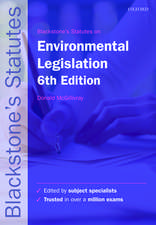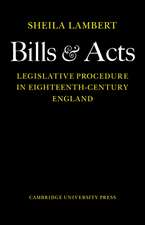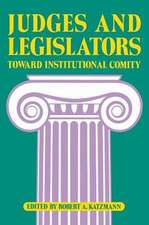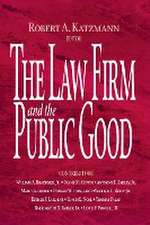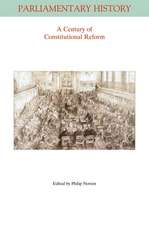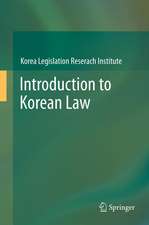Judging Statutes
Autor Robert A. Katzmannen Limba Engleză Paperback – 7 apr 2016
Preț: 128.46 lei
Preț vechi: 159.04 lei
-19% Nou
Puncte Express: 193
Preț estimativ în valută:
24.58€ • 26.69$ • 20.65£
24.58€ • 26.69$ • 20.65£
Carte tipărită la comandă
Livrare economică 11-17 aprilie
Preluare comenzi: 021 569.72.76
Specificații
ISBN-13: 9780190263294
ISBN-10: 0190263296
Pagini: 192
Dimensiuni: 208 x 140 x 15 mm
Greutate: 0.22 kg
Editura: Oxford University Press
Colecția OUP USA
Locul publicării:New York, United States
ISBN-10: 0190263296
Pagini: 192
Dimensiuni: 208 x 140 x 15 mm
Greutate: 0.22 kg
Editura: Oxford University Press
Colecția OUP USA
Locul publicării:New York, United States
Recenzii
Second Circuit Judge Robert A. Katzmann brings his unique professional career, including his distinguished experience and expertise in legislature, in academia, and as a jurist to his masterful book, Judging Statutes. With concise but lucid style, Judge Katzmann gives a thorough exposition of the analytical struggles a judge must go through while interpreting a less-than-clear statute.
A great bookcalled simply, Judging Statutes... What makes this particular book about statutory interpretation so engaging is the breadth of perspective that Judge Katzmann brings to it.
Every judge, lawyer, law professor, and law student who interprets statutes which is to say every judge, lawyer, law professor, and law student should read this book carefully. To paraphrase Justice Frankfurter: read the book, read the book, read the book.
Robert Katzmann has written an illuminating and convincing book about the importance of ascertaining the actual intent of the legislators who draft and enact our statutes. It should be required reading for all lawyers confronting questions of statutory construction when advising clients or arguing such issues before judges." -Justice John Paul Stevens (Ret.)
Judge Katzmann is a dedicated public servant and a highly regarded judge. This compelling book is a welcome addition to the increasingly urgent conversation about how courts interpret what we do as members of Congress." -Senator Charles E. Schumer
Beautifully crafted, sensitive to the contrasting workways of Congress, executive agencies, and courts, and wise in its conclusions on this contested arena of judging, this book will quickly become the essential primer for judges, legislators, and citizens who aspire to more effective government. Katzmann, the first and only political scientist appointed to the federal bench, draws on his extraordinary knowledge and experience as a judge, scholar, law professor and interlocutor between the branches to produce this splendid brief treatise on statutory interpretation." -Thomas E. Mann, W. Averell Harriman Chair & Senior Fellow, Brookings Institution
The most erudite book any American judge has ever published on statutory interpretation, combining common sense with masterful scholarship. Katzmann relentlessly insists that judges approach statutes with an appreciation of Congress's primacy and with an understanding of the utility of legislative history. He does for statutory interpretation what John Marshall did for constitutional interpretation." -William Eskridge, Jr., John A. Garver Professor of Jurisprudence, Yale Law School
Judging Statutes will profoundly influence the study and practice of statutory interpretation, combining sophisticated theoretical analysis with real-world experience. This book demonstrates the importance of an institutional perspective; interpretation includes Congress, courts, and agencies, as each engages with the statute and other branches." -Elizabeth Garrett, Duggan Professor of Law, Political Science, Finance and Business Economics, and Public Policy, University of Southern California
A judicial craftsman at the top of his art, Katzmann has written a must-read for all involved in the legislative and interpretive process."
Katzmann makes a powerful case that judges should pay attention to legislative history the words of members of Congress in debates, the committee reports explaining laws, and all of the source material that reflects how Congress really works. Moreover, Katzmann makes the apt point that textualism is especially inappropriate for judges who, like Scalia, profess to believe in judicial restraint-in the idea, that is, that judges should defer to the elected branches of government.
Judging Statutes, is both a tour de force and must reading for anybody following a particularly critical case, Halbig v. Burwell."
Judging Statutes leaves the reader with a better understanding of lawmaking, legal interpretation, and the roles of the various actors in this ongoing drama that affects all our lives." -Paul Vamvas, The Federal Lawyer
[Katzmann] can legitimately lay claim to greater knowledge and savvy than perhaps any sitting judge about how Congress actually writes laws and how the judicial branch reads and misreads them . . . Katzmann's crisply argued volume, Judging Statutes, has already attracted serious attention on the left and right."
Judge Katzmann's approach to statutory interpretation seems so plausible and balanced that it is hard to believe that anyone ever believed anything else."
Excellent and concise . . . Katzmann combines his judicial experience with his academic prowess to craft a gracious and erudite contribution to the national conversation about statutory interpretation . . . His admirable book is the essential new starting point for those interested in this old field."
A great bookcalled simply, Judging Statutes... What makes this particular book about statutory interpretation so engaging is the breadth of perspective that Judge Katzmann brings to it.
Every judge, lawyer, law professor, and law student who interprets statutes which is to say every judge, lawyer, law professor, and law student should read this book carefully. To paraphrase Justice Frankfurter: read the book, read the book, read the book.
Robert Katzmann has written an illuminating and convincing book about the importance of ascertaining the actual intent of the legislators who draft and enact our statutes. It should be required reading for all lawyers confronting questions of statutory construction when advising clients or arguing such issues before judges." -Justice John Paul Stevens (Ret.)
Judge Katzmann is a dedicated public servant and a highly regarded judge. This compelling book is a welcome addition to the increasingly urgent conversation about how courts interpret what we do as members of Congress." -Senator Charles E. Schumer
Beautifully crafted, sensitive to the contrasting workways of Congress, executive agencies, and courts, and wise in its conclusions on this contested arena of judging, this book will quickly become the essential primer for judges, legislators, and citizens who aspire to more effective government. Katzmann, the first and only political scientist appointed to the federal bench, draws on his extraordinary knowledge and experience as a judge, scholar, law professor and interlocutor between the branches to produce this splendid brief treatise on statutory interpretation." -Thomas E. Mann, W. Averell Harriman Chair & Senior Fellow, Brookings Institution
The most erudite book any American judge has ever published on statutory interpretation, combining common sense with masterful scholarship. Katzmann relentlessly insists that judges approach statutes with an appreciation of Congress's primacy and with an understanding of the utility of legislative history. He does for statutory interpretation what John Marshall did for constitutional interpretation." -William Eskridge, Jr., John A. Garver Professor of Jurisprudence, Yale Law School
Judging Statutes will profoundly influence the study and practice of statutory interpretation, combining sophisticated theoretical analysis with real-world experience. This book demonstrates the importance of an institutional perspective; interpretation includes Congress, courts, and agencies, as each engages with the statute and other branches." -Elizabeth Garrett, Duggan Professor of Law, Political Science, Finance and Business Economics, and Public Policy, University of Southern California
A judicial craftsman at the top of his art, Katzmann has written a must-read for all involved in the legislative and interpretive process."
Katzmann makes a powerful case that judges should pay attention to legislative history the words of members of Congress in debates, the committee reports explaining laws, and all of the source material that reflects how Congress really works. Moreover, Katzmann makes the apt point that textualism is especially inappropriate for judges who, like Scalia, profess to believe in judicial restraint-in the idea, that is, that judges should defer to the elected branches of government.
Judging Statutes, is both a tour de force and must reading for anybody following a particularly critical case, Halbig v. Burwell."
Judging Statutes leaves the reader with a better understanding of lawmaking, legal interpretation, and the roles of the various actors in this ongoing drama that affects all our lives." -Paul Vamvas, The Federal Lawyer
[Katzmann] can legitimately lay claim to greater knowledge and savvy than perhaps any sitting judge about how Congress actually writes laws and how the judicial branch reads and misreads them . . . Katzmann's crisply argued volume, Judging Statutes, has already attracted serious attention on the left and right."
Judge Katzmann's approach to statutory interpretation seems so plausible and balanced that it is hard to believe that anyone ever believed anything else."
Excellent and concise . . . Katzmann combines his judicial experience with his academic prowess to craft a gracious and erudite contribution to the national conversation about statutory interpretation . . . His admirable book is the essential new starting point for those interested in this old field."
Notă biografică
Robert A. Katzmann is Chief Judge of the United States Court of Appeals for the Second Circuit. The only jurist in the federal courts with a Ph.D in political science, throughout his career he has been concerned about how to make government function more effectively. At the time of his appointment to the federal bench, he was the Walsh Professor of Government, Professor of Law and Professor of Public Policy at Georgetown University; a fellow of the Brookings Institution; and president of the Governance Institute. Numerous awards for his public service, as well as his legal writing, have been bestowed on Judge Katzmann since joining the bench.
